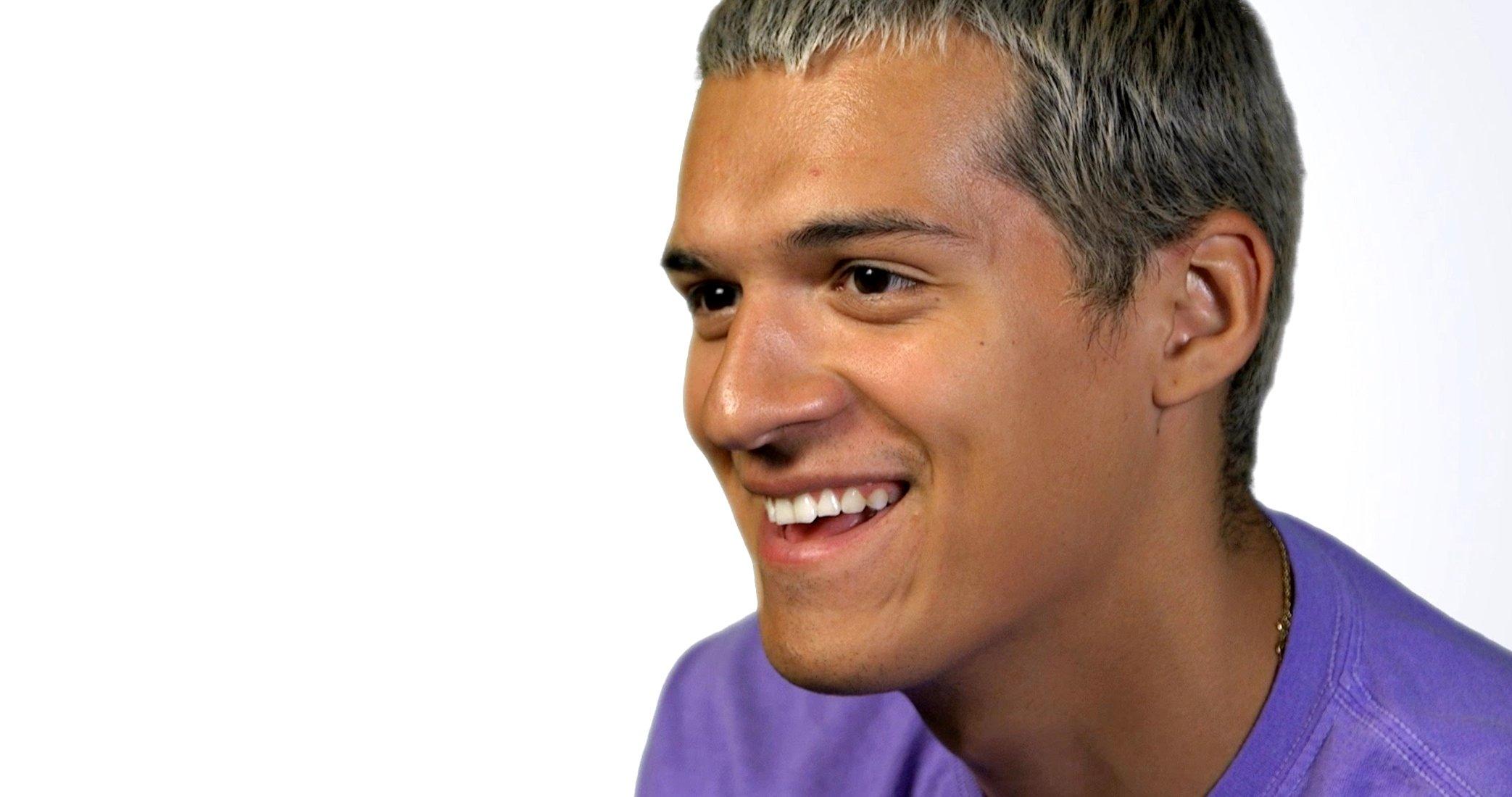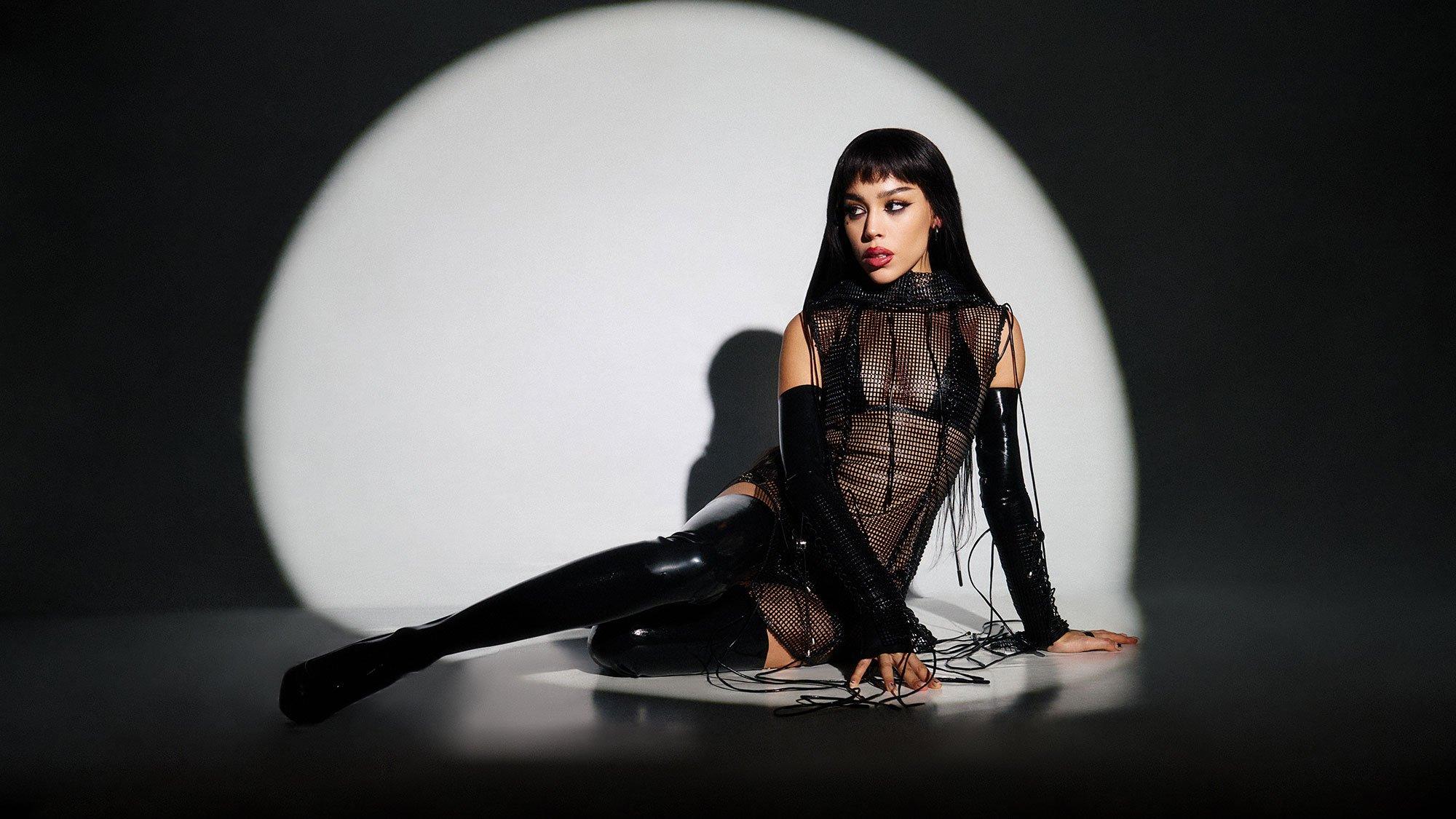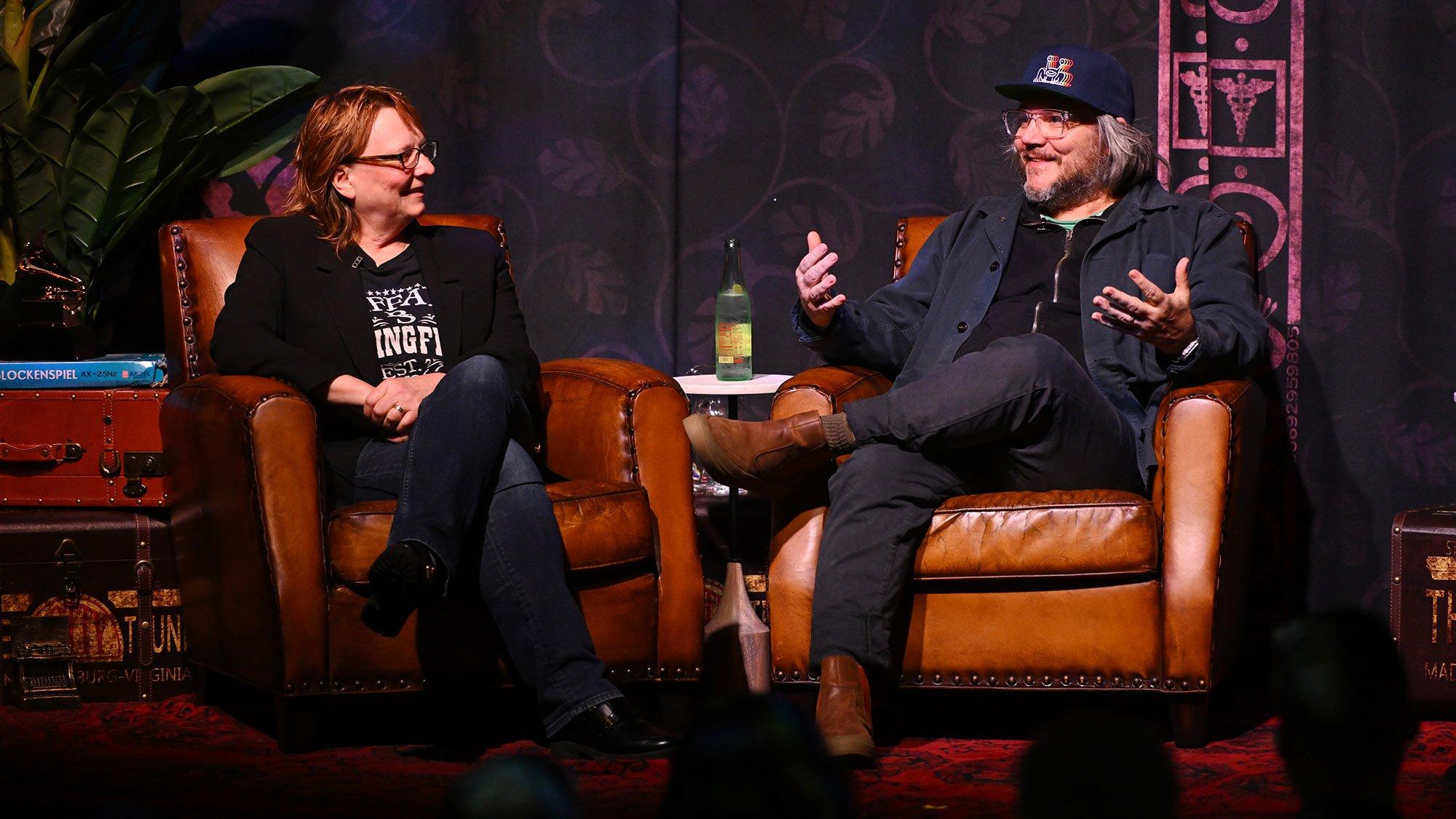Danna Paola feels comfortable coexisting with her shadows.
The Mexican singer, model and actress first appeared on television at age five, and has spent recent years dwelling on memories of her youth. Now 28, Danna is dismantling the myths and taboos around her artistic persona.
This process resulted in CHILDSTAR, which arrives April 11. Danna's seventh LP is her most authentic production and one where she makes peace with her childhood.
Accomplishing this freedom took her two years of therapy, the singer confesses to GRAMMY.com. "I deconstructed myself and my beliefs and unlearned many things to learn new ones. The pandemic also opened Pandora's box. That's where everything came out."
Through that self-discovery process, Danna knew she had to break with a constant that had accompanied her for two decades: acting. The last character she portrayed was Lucrecia in the Netflix series "Elite," a popular role that led her to reignite her music career after an eight-year hiatus. Beginning to live authentically, without the vices that fictional characters can leave behind, was the crucial step that led the Latin GRAMMY-nominated singer to CHILDSTAR.
CHILDSTAR follows a lengthy depression and a break from her management team, which Danna has described as controlling. On the new album, she embraces indulgence — singing about female pleasure for the first time in her career — and draws inspiration from her after-hour encounters. CHILDSTAR's darkly powerful electronic rhythms and synth-pop, tell a tale about a weekend of partying, alcohol, and sex to create the perfect escape from "your demons, your life, and your reality."
Ahead of her album release, Danna Paola discussed the processes that led her to break with her past, how her boyfriend was instrumental to her return to the studio, the synthesizer that inspired the album's sound, and the gift that Omar Apollo left for her.
This interview has been edited for length and clarity.
Tell me about the process that led you to co-produce for the first time.
This album is made with a lot of love, many hours, but above all, a lot of freedom. It's a very energetic and aggressive album, liberating.
It was a journey of introspection, empowerment, and self-confidence. Beyond being a sad story, the complete meaning of the album is not to talk and throw shade at my childhood. [It's about what] I have discovered since that first therapy session to find and make peace with my past, and that instead of being a place of embarrassment for me, it empowered me.
CHILDSTAR is the first album in my entire career where every inch, detail, and decision are curated and made by me. That's something that I am very proud of. I made an album for myself and that little Danna who has always wanted to do this.
It is energetic, super intense, and sexual. Electronic music, funk, dance, synth-pop, and R&B lead me to drain all these emotions. The choice of each song, and the details and creating them from start to finish, [has] been very cathartic.
In "The Fall," you sing, "You don't know me, you don't know s–– about me. I'm not a shooting star." Was it painful to relive the memories of being a child star?
Yes. I grew up in 2000s television. Back then, creating a child's image came from a lot of machismo: being the perfect girl, the girl who doesn't speak badly, the girl who smiles for everything, and whose characters are all good. She can't do bed scenes, can't talk about sex.
With this project, I embrace that [version of] Danna. I told that girl that everything would be fine. It's OK if you make mistakes, and it is OK to fall in love. Falling in love terrified me because I've been on different projects… every six or eight months; the longest a project lasted for me was a year. I made relationships with people and friends, [but] people always left my life. I built a pretty lonely life; I almost did not spend time with my family. I poured my life into work.
I had this distortion of reality where Danna Paola was the superheroine, and I forgot who Danna was. That's why I stopped acting; creating characters and being in someone else's skin was moving me further and further away from discovering myself as a human being in the ordinary course of life, of creating myself based on situations, emotions, and relationships.
In therapy, of course, I understood that. I made peace, and today, I am discovering many beautiful things about myself as a child that were precious, happy, and full of love. Of course, I don't blame my parents because they did their best. Nobody teaches you how to be a child star from age five.
The album led you to shine a light on your darkest sides. What did you discover about yourself and Danna as a person and artist?
I was terrified to take risks, to speak, or to create. [To me] creating a project takes a long time, at least with music. I discovered that, for me, [making music] is a spiritual act. It is an everyday practice. It is to continue to discover and continue to learn. It's falling in love again with my profession and giving the industry another chance.
I also learned that our capacity for reinvention is infinite so we can start over. Today, I also begin to be a little more human. However, I don't aspire to be an example for anyone. I want to share my experiences and the lessons I have learned so I can move forward, continue to love what I do, and not lose myself. I used to say that I wouldn't make it to 27. That was in my head.
I'm making a wonderful balance between my personal life and my work. I'm also building my family at home with my boyfriend [artist Alex Hoyer], my two little dogs, my friends, and my chosen family. It's making peace and creating the life of my dreams.
Do you like who you are now?
I love it. I continue to polish many things about my personality. I work hard to be a better human being. Life is about learning and transforming yourself. I can release another album in a couple of years; I may release another this year. I don’t want to stop making music. [I want to] continue transforming myself through my art.
In the first two tracks, "The Fall" and "Blackout," you repeat that people don't know you. How would you describe the Danna of this record?
She's a woman who is very sure of who she is, and nobody has given anything to me. I'm in love with my project, my music, and my life, and I'm enjoying it a lot.
I struggle a lot with fame, but today, I present myself as a liberated woman in a good headspace. I don't pretend to be perfect or an example for anyone. Quite the opposite; all I do is share experiences, lessons, and music.
I'm an artist in every sense of the word. I'm a creative, honest person and have a lot of love to give, and I love receiving it, too. That should be mutual. It's an energetic practice that when one really does things with love, the universe always rewards it.
In songs like "Atari" and "Platonik," you openly sing about female sexual pleasure. Is it the first time in your career that you sing about your sexuality?
Yes. This album is very sexual. There's a taboo when it comes to women talking about sex. In reggaeton, there are thousands of ways in which we can talk about sexuality. In my case, I had always considered it forbidden.
It's what I told you about the kid [actress] who doesn't [about sex], who's a virgin until marriage. There is no richer pleasure than sex and the sexual pleasure you can have as a woman. There's liberation, to feel good about yourself, with your body, and also the sexual education that I can also share with generations.
This liberation with my femininity is something that I also discovered: The pleasure of being a woman and having many experiences in my life that have led me today to enjoy who I am, to have a happy sex life, and to share it through my music.
In "Platonik," you discuss sexualizing a platonic relationship with a woman and sing "I can't help what I think in my bed." Why was exploring that relationship important to you?
I had a platonic love with a girl at a stage of my life. I kept this to myself; it was a personal experience that opened the conversation to a beautiful story.
I wrote this song with [producer and songwriter] Manu Lara. We made it in half an hour. This song has something unique because, besides talking about a personal experience that is also super sexual, it talks about universal love.
That's why I say that CHILDSTAR is an album of many stories that have marked my life and beyond, talking about only the childhood stage, which is what everyone speculates, but that's not the case.
You’re flirting more with synth-pop in this album. What caught your attention about this genre?
It comes from this aggressive part of saying, here I am. For me, electronic music connects and drains emotions. Every time I've been out partying, electronic music has been liberating for me, and when I put it together with pop and these lyrics, it has become a new way to enjoy the genre.
While creating CHILDSTAR in Los Angeles, I fell in love with a Jupiter [synth] we found at Guitar Center. That synthesizer is in every song. The inspiration [to use the instrument] comes from John Carpenter's synth album [Lost Themes III: Alive After Death]. In it, I discovered synthesizers had a way of incorporating sound design and darkness into the album.
[Synth-pop is] the expression of that need to bring out the energy I had stuck through music. It’s an emotional purpose, the connection I have with electronic music.
Your boyfriend, Alex, was instrumental in making "XT4S1S" when you didn’t want to enter a recording studio. How was reconnecting with music with help from your romantic partner?
"XT4S1S" is the song that, to both of us, as a couple and as producers, connected us on a hefty level.
I was super blocked. It took me several years to get out of my depression hole. We returned one day from [La Marquesa park] here in Mexico, and started chatting. Alex opened his laptop and started pulling out a beat.
I started throwing melodies, and [shortly] we had the chorus. It brought me back to life. I started crying with excitement because I finally felt again these desires and this emotion that you feel when you create a song, and you can’t stop moving forward and keep creating.
I remember we recorded my vocals on a voice note and sent it to [the production software] Logic. Then, it took us four months to produce this song because it was a lot of discovery, in this case, for me as a producer.
Alex is a great musician, artist, a genius — and I don’t say that because he’s my boyfriend. Artistically, there’s a fascinating world inside his head that I have learned a lot from.
The track "Amanecer," which features Omar Apollo, breaks dramatically with the story you tell in the album. Why did you end that party cycle with a more folksy, chill song?
"Amanecer" is a track that has us all in love. It was the last song I recorded for the album.
I wrote it to my ex. On my birthday, he called me — I was already with Alex — and it was super weird. I always feared running into him on the street, seeing him with someone else, and feeling something. And it was the exact opposite. I had already healed internally, and that wound had stopped hurting. I stopped feeling all the emotions I had gone through in K.O., [the album nominated for Best Vocal Pop Album at the 2021 Latin GRAMMYs].
This song talks about knowing how to make peace and understanding how to let go. It’s the dawn of the album. It’s perfect to release all the drama, and all the intensity, and aggressiveness that is the entire album itself.
[The song invites you] to hug yourself and say everything will be fine. There is always an opportunity to start over.
It also has a beautiful story. Manu [Lara] taught Omar Apollo the instrumental parts of the song, and he made some melodies. At the moment of receiving them, [Omar] agreed we would make a song together, [but] it was almost impossible to record together.
[Instead, Omar] told me "You can use the melodies I made" and left me the last part of "Amanecer." He left us with that magical essence.
10 Women Artists Leading A Latin Pop Revolution: Kenia Os, Belinda & More















